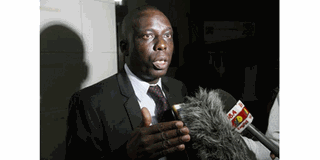SDT ruling, a difficult balancing act

Sports Disputes Tribunal chairman John Ohaga addressing the media in Nairobi in the past.
What you need to know:
- This explanation sheds light on the conditions in which the SDT has to work. At the moment, FKF county elections are done and dusted. We fear that if anyone moves to court to dispute the results, they may be in for a long wait.
- When the results eventually come out, they will not matter anymore. In view of the conditions that the SDT is working in, I take this opportunity to apologise to the SDT and to laud their efforts in dispute resolution. But more needs to be done.
Last week in this column, we were in a state of perplexion following the delivery of a ruling by the Sports Dispute Tribunal (SDT) in a row over the halting of the Kenyan Premier League.
The Tribunal ruled that Football Kenya Federation (FKF) president Nick Mwendwa had acted illegally by ending the league unilaterally and that “the king was without a crown”.
The SDT also chided the Kenyan Premier League organisers for rushing to court before exhausting all dispute resolution mechanisms.
What we found unacceptable was the fact that these complaints had been lodged with the SDT last May. We had expected the Tribunal to deliberate on the matter swiftly. The SDT was accused of taking a lengthy period to sort out such weighty matters affecting the smooth running of football.
Since the SDT stated that Mwendwa’s decision to declare Gor Mahia the league champions was illegal, football stakeholders were left wondering whether to stick with the FKF chief’s decision or not, considering it was too late to go back and rectify the mistake.
We are informed that since March, FKF had lodged a number of complaints in court.
In reaction to remarks in this column, the SDT chairman said: “With respect to your observation that the decision is ‘too little, too late’, I just thought I would remind you that the High Court suspended the work of the Tribunal for a considerable period of time after the start of the case in question following the numerous challenges filed in the High Court sparked by the decision of the Tribunal rendered on March 17 which annulled the FKF polls.
Thereafter, FKF lodged objection after objection challenging the Tribunal’s jurisdiction and powers.
Obviously, these factors have had a significant effect on the speed with which we were able to hear and determine the recent spate of disputes revolving around the FKF, its elections and decision making process.”
This explanation sheds light on the conditions in which the SDT has to work. At the moment, FKF county elections are done and dusted. We fear that if anyone moves to court to dispute the results, they may be in for a long wait.
When the results eventually come out, they will not matter anymore. In view of the conditions that the SDT is working in, I take this opportunity to apologise to the SDT and to laud their efforts in dispute resolution. But more needs to be done.




